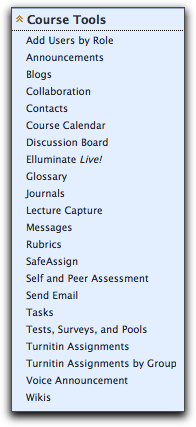Because of their popularity, the makers of course management systems (pretty soon we’ll just say “Blackboard” like we say “Kleenex” to mean all CMSs) have added social networking tools. These blogs and wikis, are, of course, inside the courses, which are inside the system.
When these “Web 2.0” tools first appeared in CMSs, I actually considered using them, but by then I had moved to Moodle to get away from Blackboard’s horrible threaded discussion forums. The nested forums in Moodle were much better, but the blogs there were tied to the students profiles. In other words, you’d click on a student’s name somewhere in the class, and go to a separate page to read their blog. Clunk, clunk, no thanks.

If I were going to use blogs with students, I would think I had two choices. I could have one big blog and make all of them authors (my English prof colleague Jim Sullivan does that very successfully) or I could have each student make their own blog, then have RSS feeds aggregated somewhere (Netvibes, maybe, as Michael Wesch does) so I could follow them more easily. I would do this because my goal would be students feeling they have ownership of their work, and their own space. It would also be good if they got input from the outside, although there can be other issues with that, of course. Also, if they wanted to continue blogging, it would be easy for them.
 This last, the perpetuity of their work, is important as a default. As a student, I used to save all my returned papers. But students in an online class lose all their work unless they’ve saved it themselves, and that only works for written stuff before there’s any feedback. Or they have to copy and paste everything. So a blog inside a CMS would defeat pretty much everything I’d want students using blogs for!
This last, the perpetuity of their work, is important as a default. As a student, I used to save all my returned papers. But students in an online class lose all their work unless they’ve saved it themselves, and that only works for written stuff before there’s any feedback. Or they have to copy and paste everything. So a blog inside a CMS would defeat pretty much everything I’d want students using blogs for!
Wikis are a different matter, because essentially to me a wiki is one of two things. It can be a website space like a blog, controlled and updated primarily by one person, usually the instructor. Or it can be a collaborative document, like a Google Doc. (I will say I don’t see much in between, having repeatedly witnessed wikis set up by one or two people fail as collaborative websites, with the originators begging in vain for participation form other people — there is still a fear of editing someone else’s “place”.)
A collaborative document can be totally appropriate for the internal dynamics of a course. A few years ago, I used a wiki (PB Wiki, now PB Works) to have students create the class quizzes together. I could see who was participating, and have quiz questions written by the students themselves. That wouldn’t need to be public or perpetual.
But such transient work is likely the exception — in general, I think that adding social networking tools to course management systems undermines the broader learning goals of those tools, which tend to be more public (i.e. “social”). Social takes time, and there is at most a semester in a course environment. In addition, I’m not sure students understand the limitation of doing things like this inside a CMS — they may assume, like Facebook users, that’s it’s all out there forever. I notice very few college students understanding the basics of internet architecture….but that’s a whole other post!
We are getting introduced to the Ultranet in Victoria, it’s a space where teachers can share resources and create collaboration pages. When the students are on they will be able to add to the class forum and create a class wiki. It’s great that the internet is being used for this type of classroom interaction and I believe we will go a lot further with how students and teachers use developing technology more within the classroom.
Thankyou Lisa for keeping people up to date on these developments.
I’m working on expanding my online courses outside of the CMS, and I came across your blog while browsing. I appreciate your ideas on using wikis and hosting them outside the CMS (I’m not too tech saavy, and can use all the help I can get!). My question is, how easily and efficiently can you keep these different sites organized and running through the CMS? I assume it wouldn’t be hard to link to them, but I’m wondering how easy it is to keep track of and grade assignments. One thing I enjoy now is how all assignments within the CMS are linked automatcially to the gradebook. It doesn’t seem like that would be possible if, say, discussions were run through another site. Thanks!
Hi Richard! In my experience, the closed systems are usually the most integrated, connecting assignments and gradebook. So it isn’t easy to run these sites *through* the CMS. I know a number of faculty who only use the CMS for formal testing and grading. In the case of discussions, running them in an outside site does mean a changing in assessment practice — I think this is where the self-assessment becomes indispensable. The activity of the course can be run anywhere, but the assessment can be inside the system for easy grading.
Assessment is definitely the sticking point for those of us trying to break away from the CMS!